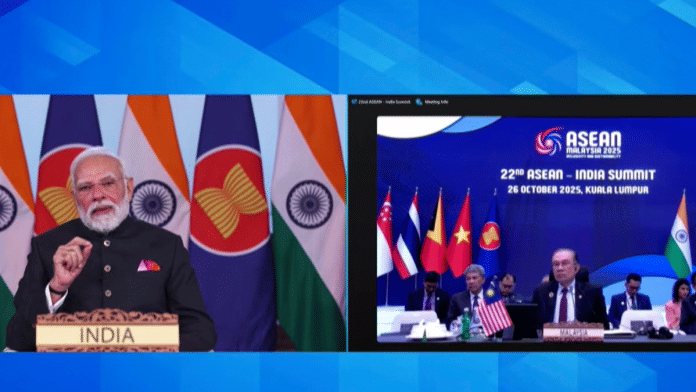New Delhi: The India-ASEAN partnership is a “powerful foundation for global stability and growth”, Prime Minister Narendra Modi declared Sunday, while highlighting that the relationship has continued to make “steady progress” even in this “uncertain” time globally.
“Even in these times of uncertainty, the India-ASEAN Comprehensive Strategic Partnership has made steady progress. Our strong partnership is emerging as a powerful foundation for global stability and growth,” Modi said in his opening remarks at the 22nd ASEAN-India Summit.
The Prime Minister attended the summit virtually, announcing the decision three days ago, after a call with US President Donald Trump Tuesday. Modi has attended both physically and virtually almost every ASEAN-India summit since assuming power in 2014.
This year, while the Prime Minister is attending the ASEAN-India summit virtually, External Affairs Minister S. Jaishankar will represent India at the 20th East Asia Summit Monday. The last time Modi gave the summit a miss was in 2022, when then Vice-President Jagdeep Dhankhar led the Indian delegation to the ASEAN related summits held in Cambodia.
The Association of Southeast Asian Nations (ASEAN) has emerged as an important diplomatic partner for India, especially as New Delhi envisioned its outreach as a part of its ‘Act East Policy’ under Modi.
“We are fellow travellers in the Global South. We are not only trade partners, but also cultural partners. ASEAN is a key pillar of India’s Act East Policy. India has always fully supported ‘ASEAN centrality’ and ASEAN’s outlook on the Indo-Pacific,” Modi said.
My remarks during the ASEAN-India Summit, which is being held in Malaysia. https://t.co/87TT0RKY8x
— Narendra Modi (@narendramodi) October 26, 2025
The PM announced that 2026 will be the year of ‘ASEAN-India Maritime Cooperation’ highlighting the core area of interests between the 10-member regional bloc and New Delhi.
“We are also vigorously advancing mutual cooperation in education, tourism, science and technology, health, green energy, and cybersecurity. We will continue to work together to preserve our shared cultural heritage and strengthen people-to-people ties,” Modi added.
Malaysian Prime Minister Anwar Ibrahim, who is chairing the summit in Kuala Lumpur, announced that India and ASEAN should “conclude” the review of the agreement of trade in goods by “this year.”
However, Modi made no mention of the ongoing review of AITIGA (ASEAN-India Trade in Goods Agreement) in his own opening remarks. It has featured in a number of bilateral statements during Modi’s interaction with different ASEAN member-states in the last year.
Also Read: India, Philippines elevate ties to strategic partnership; Modi renews push for ASEAN FTA review
AITIGA & Trump
The AITIGA came into force in 2010, with the aim of eventually leading to a free trade area between the ten-member countries of the regional organisation and New Delhi.
However, its implementation has been uneven at best, with a number of countries yet to reduce the tariff lines as envisioned, which has led to India calling for a review to update the agreement.
At least 10 rounds of meetings of the AITIGA joint committee have been held to review the agreement. ASEAN accounts for roughly 11 percent of India’s global trade, with two-way bilateral trade touching $123 billion in the 2024-2025 financial year, according to the Ministry of Commerce and Industry.
The AITIGA review has remained an irritant in the diplomatic relationship. ASEAN has 10 members, that are: Brunei Darussalam, Cambodia, Indonesia, Myanmar, Laos, Malaysia, the Philippines, Thailand, Vietnam and Singapore. Timor-Leste joined ASEAN Sunday as the eleventh member after nearly 14 years of negotiations.
Modi’s decision to skip the summit was announced soon after a call with Trump. The US President is in Kuala Lumpur to attend the signing of an expanded ceasefire deal between Thailand and Cambodia to put an end to the border skirmish that broke out earlier this year. Trump met with a number of leaders on the margins of the summit, while announcing deals with Malaysia, Thailand and Cambodia.
India and the US have been locked in intense negotiations over a trade deal. Trump imposed 50 percent tariffs on Indian exports, which came into force in August, further leading to a cooling in ties. However, Modi and Trump have spoken at least three times in the last 45 days, indicating a partial thaw in ties. Trump’s tariffs have also impacted the ASEAN members.
Apart from the US President, Canadian Prime Minister Mark Carney, Brazilian President Lula, South Korean President Lee Jae Myung, Japanese Prime Minister Sanae Takaichi, New Zealand Prime Minister Christopher Luxon, and Chinese Premier Li Qiang are some of the other international leaders in attendance of the ASEAN-related summits in Kuala Lumpur.
The East Asia Summit is a leaders’ level regional forum. There are 18 countries in attendance at the East Asia Summit, which includes the ASEAN 10, along with the US, Australia, India, China, Russia, New Zealand, Japan and the Republic of Korea (South Korea).
(Edited by Tony Rai)
Also Read: India-Brazil issue joint declaration to deepen trade as Delhi seeks to diversify export markets






